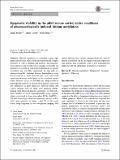| dc.contributor.author | Ayoub, Albert | |
| dc.contributor.author | Rakic, Pasko | |
| dc.contributor.author | Benoit, Jamie Dale | |
| dc.date.accessioned | 2016-11-22T21:01:43Z | |
| dc.date.available | 2016-11-22T21:01:43Z | |
| dc.date.issued | 2015-11 | |
| dc.date.submitted | 2015-04 | |
| dc.identifier.issn | 1863-2653 | |
| dc.identifier.issn | 1863-2661 | |
| dc.identifier.uri | http://hdl.handle.net/1721.1/105433 | |
| dc.description.abstract | Histone acetylation is considered a major epigenetic process that affects brain development and synaptic plasticity, as well as learning and memory. The transcriptional effectors and morphological changes responsible for plasticity as a result of long-term modifications to histone acetylation are not fully understood. To this end, we pharmacologically inhibited histone deacetylation using Trichostatin A in adult (6-month-old) mice and found significant increases in the levels of the acetylated histone marks H3Lys9, H3Lys14 and H4Lys12. High-resolution transcriptome analysis of diverse brain regions uncovered few differences in gene expression between treated and control animals, none of which were plasticity related. Instead, after increased histone acetylation, we detected a large number of novel transcriptionally active regions, which correspond to long non-coding RNAs (lncRNAs). We also surprisingly found no significant changes in dendritic spine plasticity in layers 1 and 2/3 of the visual cortex using long-term in vivo two-photon imaging. Our results indicate that chronic pharmacologically induced histone acetylation can be decoupled from gene expression and instead, may potentially exert a post-transcriptional effect through the differential production of lncRNAs. | en_US |
| dc.description.sponsorship | Natural Sciences and Engineering Research Council of Canada (Postgraduate Fellowship 403855-2011) | en_US |
| dc.description.sponsorship | Yale University. Department of Psychology | en_US |
| dc.description.sponsorship | Yale University. Kavli Institute for Neuroscience | en_US |
| dc.publisher | Springer Berlin Heidelberg | en_US |
| dc.relation.isversionof | http://dx.doi.org/10.1007/s00429-015-1138-0 | en_US |
| dc.rights | Article is made available in accordance with the publisher's policy and may be subject to US copyright law. Please refer to the publisher's site for terms of use. | en_US |
| dc.source | Springer Berlin Heidelberg | en_US |
| dc.title | Epigenetic stability in the adult mouse cortex under conditions of pharmacologically induced histone acetylation | en_US |
| dc.type | Article | en_US |
| dc.identifier.citation | Benoit, Jamie, Albert Ayoub, and Pasko Rakic. “Epigenetic Stability in the Adult Mouse Cortex under Conditions of Pharmacologically Induced Histone Acetylation.” Brain Structure and Function 221.8 (2016): 3963–3978. | en_US |
| dc.contributor.department | Massachusetts Institute of Technology. Department of Brain and Cognitive Sciences | en_US |
| dc.contributor.department | Picower Institute for Learning and Memory | en_US |
| dc.contributor.mitauthor | Benoit, Jamie Dale | |
| dc.relation.journal | Brain Structure and Function | en_US |
| dc.eprint.version | Author's final manuscript | en_US |
| dc.type.uri | http://purl.org/eprint/type/JournalArticle | en_US |
| eprint.status | http://purl.org/eprint/status/PeerReviewed | en_US |
| dc.date.updated | 2016-08-18T15:27:09Z | |
| dc.language.rfc3066 | en | |
| dc.rights.holder | Springer-Verlag Berlin Heidelberg | |
| dspace.orderedauthors | Benoit, Jamie; Ayoub, Albert; Rakic, Pasko | en_US |
| dspace.embargo.terms | N | en |
| mit.license | PUBLISHER_POLICY | en_US |
| mit.metadata.status | Complete | |
